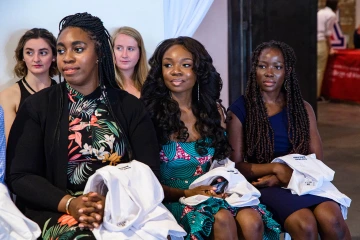What Faculty and Students Are Saying About Racism in Health Care
Health Sciences Connect asked faculty and students across the University of Arizona Health Sciences about racism in health care. Answers were edited for brevity.
On social unrest after George Floyd’s death and the impact it had on campus:

Chikodi Ohaya (center), a first-year student at the College of Medicine – Phoenix, at the Class of 2025 White Coat Ceremony in July 2021. Ohaya is a member of the college’s chapter of the Student National Medical Association, which comprises medical students of color, and White Coats for Black Lives.
“As a Black medical school applicant the year George Floyd was murdered, I paid close attention to how schools responded to the social outcry for justice. I was impressed by the College of Medicine – Phoenix’s openness to having difficult conversations on racism in medicine, and I am grateful for the opportunity to serve on the ART (Anti-Racist Transformation) in Medical Education cohort. This has made me feel like a valued member of the school’s community.”
– Chikodi Ohaya, first-year medical student and member, White Coats for Black Lives chapter, UArizona College of Medicine – Phoenix
“The impact of George Floyd’s death probably improved awareness to social justice and racial issues. For minority people, it may be considered that it was about time such activities were conducted to such an extent. My views have not evolved that much, which is to say: Not all people are racist, and some people will be what they are by choice.”
– Luwanika Mlera, PhD, assistant research scientist, Department of Immunobiology, UArizona College of Medicine – Tucson
How personal experience has shaped your views on racism in health care:
“Before I moved to the U.S., racism was a foreign concept for me. Racism in medicine is real and detrimental to our society. As a trauma nurse, I witnessed firsthand health-care disparities related to racism. My clinical practice and current job performance in nursing academia have largely been impacted by racism. I have experienced racial attacks, microaggression, unreasonable workloads, sabotaging and retaliation as a victim. My opinions on racism have grown stronger and stronger over the years, which has shaped me into a passionate anti-racism activist today.”
– Zhizhong "Z" Li, MSN, RN, PhD candidate in data and systems science, UArizona College of Nursing
“I’ve walked into rooms of patients and or staff members, and despite introducing myself, having my badge, stethoscope, and jacket amongst other traditional indicators that I am in the health field, they would ask me if there is another doctor coming. Nevertheless, I think we’re in a little better time where individuals from all disciplines are more aware and feel more empowered to discuss issues and take steps towards finding longer term solutions. This gives me hope and comfort in continuing in the field and trying to contribute when and where I can for the next generations.”
– Sophia Williams, MD, pulmonologist and associate professor, Child Health, College of Medicine – Phoenix, and faculty advisor to the college’s White Coats for Black Lives chapter
How personal experiences and concerns about racism in health care have translated into action on campus:
“I do think the College of Public Health has been trying to make moves for equity, but the pace has been slow. The college is in the process of hiring an assistant dean for diversity, equity and inclusion, but the search is going on a year now.”
– Mariah Albertie, academic advisor, Mel and Enid Zuckerman College of Public Health
“Since creation of our 12 Action Steps Toward Inclusive Excellence (in 2020), we secured more than $375,000 in scholarship funding for students underrepresented in medicine. Students founded the White Coats for Black Lives chapter here. We’ve also begun to integrate anti-racism in medicine teachings in our curriculum for medical students as well as for faculty development. And the college was picked as one of 11 medical schools in North America to participate in the ART in Med Ed (Anti-Racist Transformation in Medical Education) initiative, a three-year program to transform our college into an anti-racist institution. A cohort of faculty, students and staff are leading this charge.”
– Francisco Lucio, JD, associate dean for equity, diversity and inclusion, College of Medicine – Phoenix

